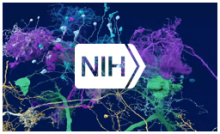
A new data sharing policy will require BRAIN Initiative researchers to submit their data to BRAIN data archives, develop a resource sharing plan, and include costs for data preparation and archiving in grant applications.
The BRAIN Initiative calls for cross-disciplinary collaborations across a wide range of disciplines. In tandem with the growth of massive storage capabilities and high-speed computing, more diverse, fragmented, and heterogeneous quantities of data are being generated than ever before. To preserve, compare, and re-analyze valuable datasets that have been collected at great expense, it is therefore critical to support the infrastructure of data archiving and storage.
To address this need, the NIH Institutes and Centers participating in the BRAIN Initiative recently announced the notice of a data sharing policy for the BRAIN Initiative (NOT-MH-19-010). Since 2014, NIH has released BRAIN Initiative notices of funding opportunities (NOFOs) that will enable researchers to produce a new dynamic picture of the brain, showing – for the first time – how individual cells and complex neural circuits interact in both time and space, and ultimately leading to new ways to treat and prevent brain disorders.
The NIH BRAIN Initiative is guided by the BRAIN 2025 report, which calls for establishing platforms for archiving and sharing data. In response, NIH released three NOFOs for building informatics infrastructure, including: Data Archives (RFA-MH-19-145), Data Standards (RFA-MH-19-146), and Integration and Analysis Tools (RFA-MH-19-147). Currently, the funded awards to establish data archives for different types of neural data include: The Neuroscience Multi-omic Data Archive (data from -omics experiments), The Brain Image Library (microscopy data), Data Archive for the BRAIN Initiative (data related to human electrophysiology experiments), OpenNeuro (magnetic resonance imaging data), and Block and Object Storage Service (electron microscopy data). Additional data archives are expected to be funded, and a complete list of BRAIN Initiative informatics infrastructure awards (including data standards and software) can be found here.
For BRAIN Initiative applications submitted after March 1, 2020, applicants will be required to share the data they collect using the BRAIN Initiative informatics infrastructure. This requirement comes from authorities granted to NIH through the 21st Century Cures Act. BRAIN Initiative fellowship applicants are exempt from this requirement but are encouraged to use the informatics infrastructure as part of their training activities.
The general expectation is that data from BRAIN Initiative awards will be submitted to the archives every 6 months, which will be distinct from sharing that data with the research community. Frequent submission allows those measuring the data to perform quality control checks as the data are deposited. Additionally, submitting the data on an ongoing basis is often easier than packaging accumulated data at the end of an award period. After the data have been submitted to the appropriate data archive, it will be shared with the research community when papers using the data have been published or at the end of the award period, whichever occurs sooner.
Applications to BRAIN Initiative NOFOs will also be required to include a Resource Sharing Plan that details a summary of data to be shared, standard(s) used to describe the data, the data archive(s) to house the data, and a proposed timeline for archiving and sharing the data with the research community. For applications that involve human subjects, the Resource Sharing Plan should have a description of whether and how the consents that will be used to obtain that data will affect the research that can be done with that data.
This informatics infrastructure will offer BRAIN researchers repositories for collaboration and data sharing across their diverse disciplines. The intent of this Notice is to therefore encourage and enable rapid progress in the development of new tools and techniques, as well as in theory and data analysis, through data archiving and sharing.
